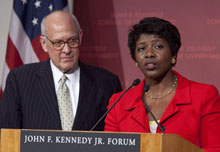Gwen Ifill wins 2009 Goldsmith career award

March 17, 2009 — The winners of the Shorenstein Center’s annual Goldsmith career award are by definition accomplished. But in listing all the achievements of this year’s recipient, Gwen Ifill, Shorenstein Center director Alex S. Jones chose to focus on something that is unlikely to find its way onto her resume.
- Watch the Video
- Read the Transcript
“She changed what was normal in Washington,” Jones said, letting the words sink in. In particular, he cited how she’d transformed Washington Week, the long-running PBS news and public-affairs program, from a bastion of “old newspaper guys who all suggested one word — gray” into a forum where remarkable diversity was in fact unremarkable — normal, in a word.
After expressing her thanks, Ifill said that the award “means that all those late-nighters I pulled at the Baltimore Evening Sun and all the coast-to-coast flights I spent covering losing candidates — mostly — and candidates debates where the candidates didn’t answer the questions, it turns out they were not for naught.” Her career began at the Boston Herald and after the Evening Sun included stints at the Washington Post and New York Times. She joined Washington Week in 1999.
Ifill’s career has also included recent highlights such as moderating the vice-presidential debate between Joe Biden and Sarah Palin — and being played on Saturday Night Live by Queen Latifah — as well as writing The Breakthrough: Politics and Race in the Age of Obama, a book that raised a storm in the debate’s build-up.
“If the candidates I profile in [The Breakthrough] have anything in common,” Ifill said, “it’s that people told them no, people told them to wait their turn.” She claimed no predictive power as a journalist, however, saying that if she’d been asked two or three years ago about Barack Obama’s chances, she would have said that he was “an intriguing but doomed upstart. I would have told you America wasn’t ready for a black president. So this tells you how much I know.”
Ifill felt that the most important change last year wasn’t racial, however, but generational. “The optimism that comes with youth may be what saves this presidency, and this nation from being dragged into what increasingly looks like an abyss.”
“Being a journalist has taught me the difference between skepticism and cynicism, and how it is a virtue to have a little of both. I’m skeptical about almost everything. I’m cynical about almost nothing,” Ifill said. “Being skeptical and being a journalist has taught me that the best lessons are not necessarily learned from the people with the most power or the loftiest titles, but sometimes just by keeping your eyes open.”
The ceremony also featured three other awards. The Goldsmith Prize for Investigative Reporting went to Debbie Cenziper and Sarah Cohen of the Washington Post for their investigative series “Forced Out,” which revealed how landlords drove hundreds of tenants from rent-controlled apartments and then profited from redevelopment. The prize for best academic book was awarded to Markus Prior for Post-Broadcast Democracy: How Media Choice Increases Inequality in Political Involvement and Polarizes Elections. The best trade book award went to Jane Mayer for The Dark Side: The Inside Story of How the War on Terror Turned into a War on American Ideals.
This article was written by Leighton Walter Kille of the Shorenstein Center. The photos were taken by Martha Stewart.